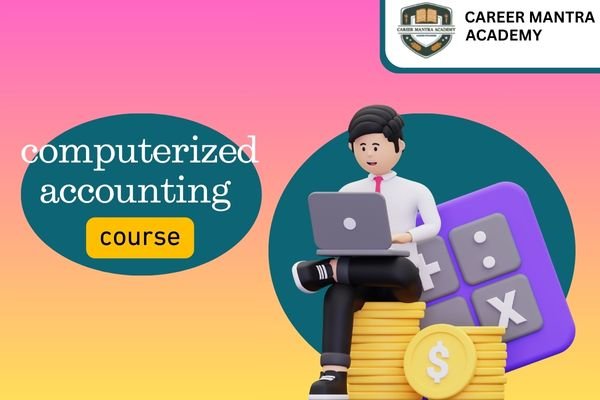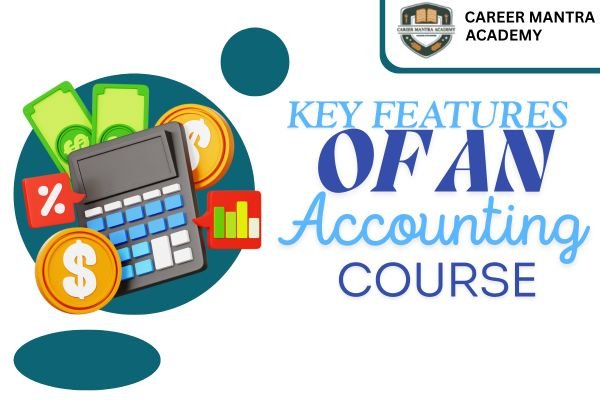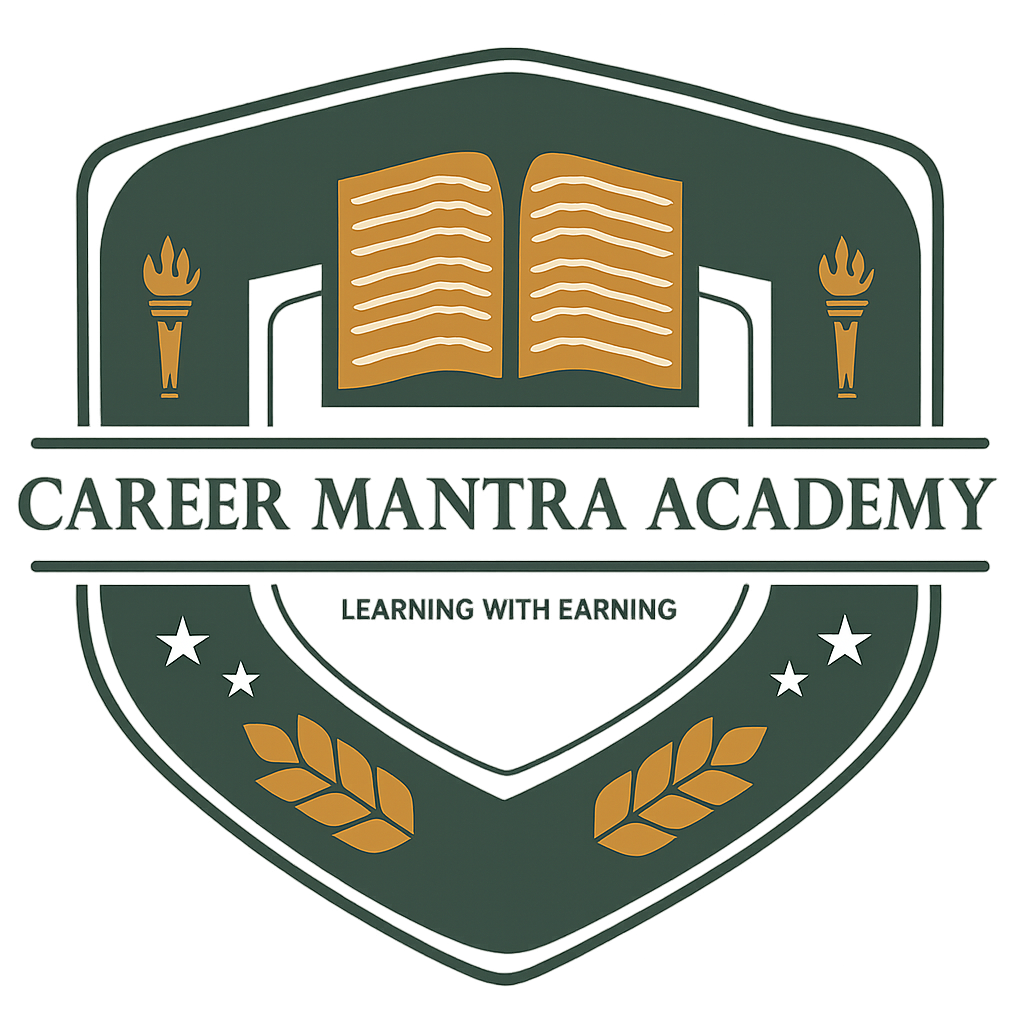
For Applying Accountancy Course Click Here…
What is a Computerized Accounting Course?
A professional training program, such as a computerized accounting course, teaches professionals and students how to utilize accounting software to manage financial records. This course focuses on utilizing computer applications to record, analyze, and present financial data more accurately and efficiently than traditional manual accounting methods.
This course introduces students to popular accounting programs like SAP, Tally, QuickBooks, and Zoho Books. Ledger creation, balance sheets, inventory management, payroll, invoicing, and taxation (including GST) are among the fundamental accounting tasks covered in the training. Additionally, students learn how to create automated financial reports that support business decision-making.
A computerized accounting course’s primary goal is to give students the practical skills they need to succeed in the modern, digital workplace. Since the majority of businesses now use digital systems instead of manual bookkeeping, this course equips students to manage accounting tasks effectively in the real world.
Students studying commerce, working professionals, business owners, and anybody else looking to learn financial management techniques can all benefit from it. In addition to developing a solid accounting foundation, students who complete this course increase their employment prospects in accounting, finance, auditing, and business management.
What Do You Learn in a Computerized Accounting Course?
A computerized accounting course covers more than just the fundamentals of accounting. It gives students practical experience with contemporary accounting software and gives them the tools they need to effectively manage financial records in the current digital business climate. The course is designed to ensure that professionals and students can immediately apply what they have learned in the workplace by combining technical knowledge with real-world application.
What you will normally learn in a computerized accounting course is broken down here:
1. Software Training (Tally, QuickBooks, Zoho Books, SAP, etc.)
Learning how to use widely used accounting software is one of the course’s most crucial components. Businesses frequently use these tools to manage and document transactions.
- Tally ERP: Helps in managing ledgers, balance sheets, GST, and inventory.
- QuickBooks: Used by small and medium businesses for bookkeeping, invoicing, and financial tracking.
- Zoho Books: Cloud-based accounting for automating invoices, bank reconciliation, and reporting.
- SAP: Advanced ERP software used in large companies for integrating accounting with business operations.
👉 Key Skills You Gain:
- Setting up company accounts
- Creating vouchers and ledgers
- Managing bank reconciliation
- Handling multi-currency transactions
- Automating routine accounting tasks
2. Financial Reporting
The foundation of accounting is accurate reporting. You learn how to use software to create and analyze various financial statement formats in a computerized accounting course.
- Balance Sheet Preparation – Shows assets, liabilities, and equity.
- Profit and Loss Statement – Tracks income and expenses for business performance.
- Cash Flow Statement – Helps analyze how cash is moving in and out of the business.
- Custom Reports – Generating MIS (Management Information System) reports for decision-making.
👉 Benefits of Learning Financial Reporting:
- You gain the ability to create automated and error-free reports.
- Reports can be generated in real-time, saving hours of manual calculation.
- You learn to analyze trends and make better financial decisions.
3. Payroll Management
One of the most important aspects of accounting is handling employee payroll. Payroll processing takes a lot of time if done by hand, but a computerized accounting course teaches you how to automate it.
- Salary Calculation – Based on attendance, allowances, and deductions.
- Employee Database Management – Storing personal and professional details securely.
- Provident Fund (PF) & Employee State Insurance (ESI) – Managing statutory compliance.
- Payslip Generation – Creating automated salary slips for employees.
- Tax Deduction at Source (TDS) – Ensuring accurate tax deductions from salaries.
👉 Advantages of Payroll Training:
- Minimizes payroll errors.
- Saves time in salary processing.
- Ensures legal compliance with tax and labor laws.
- Builds trust among employees through accurate and timely payments.
4. Taxation & GST (Goods and Services Tax)
One of the most important accounting skills is tax compliance. You can gain practical knowledge of taxation procedures, particularly GST, which is required for Indian businesses, by enrolling in a computerized accounting course.
- GST Filing – Learning how to prepare and file GST returns using accounting software.
- Input Tax Credit (ITC) – Managing claims of taxes paid on purchases.
- Tax Reports – Generating accurate tax reports to submit to authorities.
- TDS Management – Handling tax deductions on various transactions.
- Other Compliance – Learning about VAT, service tax (for references), and corporate tax basics.
👉 Why Taxation Training Matters:
- Businesses must comply with government regulations.
- Skilled accountants with GST knowledge are in high demand.
- Reduces the risk of penalties due to incorrect filing.
Key Takeaways from a Computerized Accounting Course
To summarize, here are the main things you learn in such a course:
- Practical software skills (Tally, QuickBooks, SAP, Zoho Books)
- Efficient financial reporting for better business decisions
- Accurate payroll management ensures compliance and transparency
- Comprehensive knowledge of taxation & GST processes
Additional Skills You Develop
Along with technical knowledge, you also develop:
- Analytical skills – to interpret data and reports.
- Attention to detail – to ensure accuracy in entries.
- Problem-solving abilities – to handle financial discrepancies.
- Time management – as computerized systems save time and improve efficiency.

What Are the Key Features of an Accounting Course?
The goal of a computerized accounting course is to impart both theoretical understanding and hands-on experience with contemporary accounting systems. In contrast to manual accounting, it emphasizes software and digital tools that improve the accuracy, speed, and ease of financial management. The course is designed to assist professionals, students, and business owners in comprehending how companies use technology to keep and examine their financial records.
Some of the key features include:
- Software Training: Hands-on learning of popular accounting software like Tally, QuickBooks, SAP, or Zoho Books.
- Practical Learning: Focus on real-life business scenarios, vouchers, ledgers, invoices, and financial statements.
- Financial Reporting: Training in preparing balance sheets, profit and loss accounts, and MIS reports.
- Payroll & Taxation: Knowledge of salary processing, GST, TDS, and compliance requirements.
- User-Friendly Approach: Courses are beginner-friendly with step-by-step guidance.
- Industry-Relevant Skills: Prepares learners for accounting jobs, audits, and business finance roles.
- Flexibility: Many institutes offer short-term, online, and self-paced learning options.
NOTE : The course equips learners with practical accounting skills, software expertise, and a strong foundation in financial management, making them ready for modern job opportunities.
What Do You Learn in a Computerized Accounting Course?
In a computerized accounting course, learners gain practical knowledge of managing financial data using digital tools and software. The course covers:
- Software Training: Hands-on practice with Tally, QuickBooks, Zoho Books, or SAP.
- Financial Reporting: Preparation of balance sheets, profit & loss accounts, and cash flow statements.
- Payroll Management: Automating salary calculation, deductions, and payslip generation.
- Taxation & GST: Filing GST returns, managing TDS, and ensuring compliance.
Along with these, learners also develop analytical thinking, accuracy, and problem-solving skills. By the end of the course, students are equipped with industry-relevant accounting knowledge and practical expertise, making them job-ready for roles in finance, auditing, and business management.
Who Can Join an Accounting Course?
A broad spectrum of students can enroll in a computerized accounting course. For students studying commerce who wish to pursue a successful career in accounting and finance, it is perfect. Professionals from various disciplines and recent graduates are welcome to join in order to enhance their skill set and increase employment prospects. Learning how to effectively manage their company’s accounts is beneficial for entrepreneurs and business owners. Since most classes begin with the basics, even those who are new to computers can sign up. All things considered, this course is open to anyone with an interest in digital accounting and financial management.
What Are the Benefits of an Accounting Course?
By fusing current digital tools with real-world accounting knowledge, a computerized accounting course provides a host of benefits for professionals, students, and business owners. It equips students to manage financial records effectively and precisely in the technologically advanced business world of today.
Key Benefits Include:
- Practical Software Skills: Learn to use Tally, QuickBooks, Zoho Books, and SAP for real-world accounting tasks.
- Time-Saving & Accuracy: Automated processes reduce manual errors and speed up bookkeeping.
- Career Opportunities: Opens doors to jobs in accounting, auditing, taxation, and finance.
- GST & Taxation Knowledge: Provides practical training in GST filing, TDS, and compliance.
- Business Growth: Entrepreneurs can manage their accounts independently without depending on others.
- Global Relevance: Skills gained are in demand across industries worldwide.
- Confidence & Efficiency: Helps learners handle complex accounting tasks with ease.
In short, this course not only enhances technical expertise but also boosts employability and professional growth. Whether you are a student, working professional, or business owner, the benefits of a computerized accounting course are long-lasting and career-focused.
How Is a Computerized Accounting Course Different from Manual Accounting?
| Aspect | Manual Accounting | Computerized Accounting |
| Method of Recording | Transactions are recorded by hand in books or registers. | Transactions are recorded using software like Tally, QuickBooks, or SAP. |
| Speed | Slow, as every entry is written and calculated manually. | Fast, with automated posting and instant calculations. |
| Accuracy | Higher chances of human error in recording and calculations. | More accurate due to built-in error checks and automation. |
| Data Storage | Requires physical files, registers, and storage space. | Stored digitally, easy to access and backup. |
| Report Generation | Reports take more time to prepare and may involve errors. | Reports are generated instantly with real-time accuracy. |
| Cost Efficiency | Lower initial cost but time-consuming and less efficient. | Requires investment in software but saves time and resources. |
| Scalability | Difficult to manage large volumes of data. | Can easily handle large-scale and complex transactions. |
| Tax Compliance | GST, TDS, and taxation records maintained manually. | Automated GST filing, tax reports, and compliance features. |

What Are the Career Opportunities After an Accounting Course?
Numerous career paths in finance, accounting, and business management become available to students who complete computerized accounting courses. This course is extremely valuable because there is a high demand across industries for professionals with expertise in digital accounting.
Popular Career Options Include:
- Accountant – Managing financial records, ledgers, and reports.
- Auditor – Checking financial statements for accuracy and compliance.
- Tax Consultant – Assisting businesses with GST, TDS, and tax planning.
- Payroll Executive – Handling employee salaries, deductions, and payslips.
- Finance Manager – Overseeing company finances and preparing reports.
- Bookkeeper – Maintaining day-to-day financial transactions efficiently.
- Entrepreneur – Managing your own business accounts independently.
With practical skills in Tally, QuickBooks, SAP, and other accounting software, learners can secure jobs in private companies, accounting firms, banks, and multinational corporations. This course not only enhances employability but also provides opportunities for growth in the finance sector.
What Is the Duration and Fee Structure of a Computerized Accounting Course?
| Course Type | Duration | Fee Range (INR) | Description |
| Short-Term Course | 1–3 months | ₹5,000 – ₹15,000 | Basic training in accounting software and fundamentals. Ideal for beginners or students. |
| Certificate Course | 3–6 months | ₹10,000 – ₹25,000 | Covers software training, financial reporting, payroll, and taxation in detail. |
| Diploma Course | 6–12 months | ₹20,000 – ₹50,000 | In-depth learning including advanced accounting, GST, auditing, and business management. |
| Advanced/Professional Course | 12 months or more | ₹40,000 – ₹1,00,000+ | Comprehensive program for career advancement in accounting, finance, or ERP systems. |
| Online/Self-Paced Course | Flexible (1–6 months) | ₹3,000 – ₹20,000 | Learn at your own pace with online modules, practical exercises, and software tutorials. |
What Is the Future Scope of an Accounting Course?
With companies all over the world switching to digital accounting systems, the prospects for a computerized accounting course are extremely bright. Professionals with the necessary skills are in great demand due to the growing use of software such as Tally, QuickBooks, SAP, and Zoho Books.
Students can work in corporate finance departments, banks, accounting firms, auditing, payroll management, and taxation. By enabling people to independently handle their business accounts, the course also creates opportunities for entrepreneurship.
Professionals with computerized accounting skills will continue to be highly relevant as automation, AI-based accounting tools, and GST compliance increase. Ongoing education in cutting-edge financial and software technologies can boost professional development and open up international employment prospects.
Conclusion.
Students who take a computerized accounting course gain a foundational understanding of payroll, taxation, financial reporting, and contemporary accounting software. By improving accuracy, efficiency, and compliance, it equips professionals, entrepreneurs, and students for financial management in the real world. Completing this course is a wise investment for your professional development because it opens up numerous career opportunities and guarantees that you remain competitive in today’s technology-driven business environment, which is driven by the growing demand for digital accounting expertise.
FAQs
What is the course of Computerised accounting?
A computerized accounting course is a professional program designed to teach learners how to manage financial records using accounting software. The course covers software training (Tally, QuickBooks, SAP), financial reporting, payroll management, and taxation, including GST. It equips students, professionals, and business owners with practical skills for accurate and efficient digital accounting. By completing this course, learners can handle real-world accounting tasks, improve career prospects, and stay competitive in the technology-driven financial sector.
What is the difference between a CA and an FCA?
CA (Chartered Accountant) and FCA (Fellow Chartered Accountant) are related but distinct terms in the accounting profession.
1. CA (Chartered Accountant): This is a professional designation awarded to individuals who have completed the required education, training, and exams in accounting, auditing, taxation, and finance. A CA can practice as an accountant, auditor, or tax consultant.
2. FCA (Fellow Chartered Accountant): This title is given to a senior CA with significant experience, usually after 5–10 years of practice. It reflects expertise, recognition, and a higher standing in the profession.
Key Difference: A CA is the initial professional qualification, while an FCA indicates a more experienced and established chartered accountant.
Which accounting course is best?
The best accounting course depends on your career goals, skill level, and interests. Some popular options include:
1. Computerized Accounting Courses – Focus on software like Tally, QuickBooks, SAP; ideal for practical digital accounting skills.
2. Chartered Accountancy (CA) – A professional course for accounting, auditing, taxation, and finance; globally recognized.
3. Cost Management Accounting (CMA) – Emphasizes cost control, financial planning, and management accounting.
4. Diploma or Certificate Courses in Accounting – Short-term courses for beginners or professionals seeking specific skills.
Is computerized accounting easy?
Yes, computerized accounting is considered easier than traditional manual accounting for many learners, especially with basic computer knowledge. Using software like Tally, QuickBooks, or SAP, tasks such as ledger creation, invoicing, payroll, and GST filing become automated, reducing manual calculations and errors.
While beginners may need some time to learn the software and understand accounting principles, consistent practice makes it straightforward. Overall, it simplifies accounting processes and is beginner-friendly compared to manual bookkeeping.
Which accounting qualification is best?
The best accounting qualification depends on your career goals:
1. CA (Chartered Accountant): Ideal for auditing, taxation, and finance roles; globally recognized.
2. CMA (Cost Management Accountant): Focuses on cost control, financial planning, and management accounting.
3. CPA (Certified Public Accountant): Suitable for international accounting and finance careers.
4. Computerized Accounting Certification: Best for practical skills in software like Tally, QuickBooks, SAP; suitable for beginners or working professionals.
What type of accountant is in most demand?
Currently, the most in-demand accountants are those skilled in digital and specialized accounting. This includes:
1. Certified Chartered Accountants (CAs): Expertise in auditing, taxation, and corporate finance.
2. Management Accountants/CMA: Focus on cost control, budgeting, and financial planning.
3. Computerized Accountants: Skilled in software like Tally, QuickBooks, SAP, and GST compliance.
4. Tax Accountants: Experts in income tax, GST, and corporate tax filings.
5. Forensic Accountants: Specialize in fraud detection and financial investigations.
What are the 7 types of accounting?
Accounting can be divided into seven main types, each serving a specific purpose in business and finance:
1. Financial Accounting – Recording and reporting financial transactions for external stakeholders.
2. Management Accounting – Focused on internal business planning, budgeting, and decision-making.
3. Cost Accounting – Tracking and analyzing costs to control expenses and improve profitability.
4. Tax Accounting – Managing taxes, GST, TDS, and ensuring compliance with government laws.
5. Auditing – Examining financial records for accuracy and legal compliance.
6. Forensic Accounting – Investigating financial fraud, disputes, and legal cases.
7. Government Accounting – Managing and reporting finances for government organizations.
